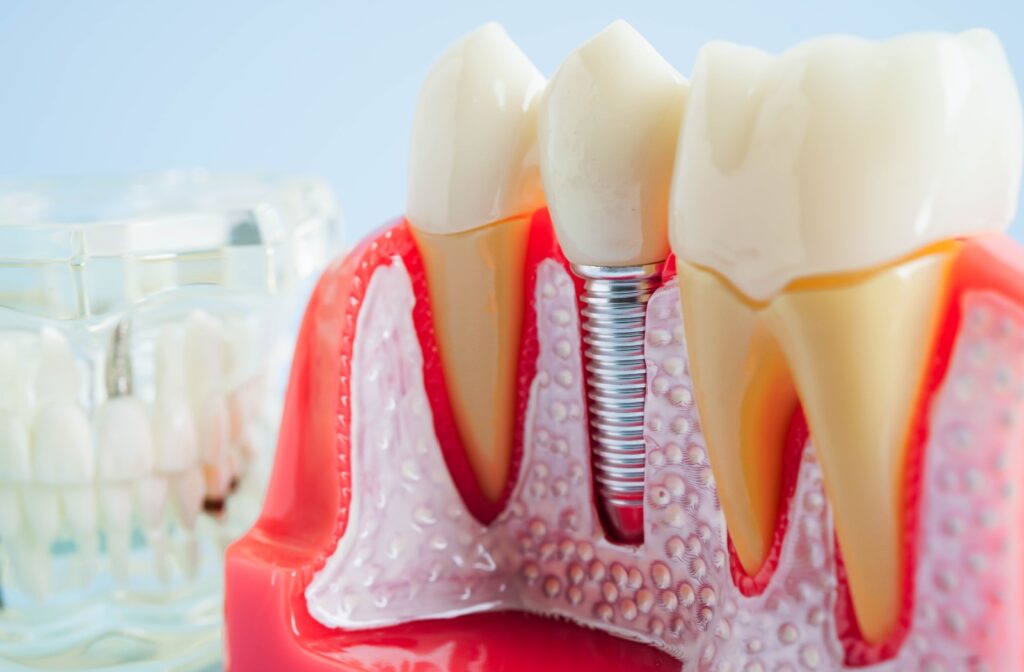A missing tooth can change how you eat, speak, and feel about your smile. However, exploring your options for replacing a missing tooth can be the first step toward feeling like yourself again. If you’re looking into possible solutions, dental implants offer a way to restore your smile’s function and appearance.
Here’s a look at the steps involved, from your first consultation to life with your new tooth. Dental implants are a comprehensive solution designed to replace a missing tooth from root to crown, helping you get back to your daily life.
Understand Dental Implants & Your Smile
Dental implants are designed to function much like a natural tooth root, providing a stable foundation for a replacement tooth. While there are a few different types of dental implants, they all share the goal of restoring your smile.
What Is a Dental Implant?
A dental implant is a small post, typically made of titanium, that is placed into your jawbone. It acts as a strong anchor for a replacement tooth. The system has three parts working together.
- The Implant: A small post that fuses with your jawbone.
- The Abutment: A connector that holds the new tooth.
- The Crown: The new tooth, which is custom-made to match your other teeth.
How Implants Can Help Your Oral Health
Implants can help you eat your favourite foods with ease and speak more clearly. They can also help prevent other teeth from shifting over time and support your natural facial structure.
Consider Dental Implants for Your Smile
Implants may be a suitable option if you have one or more missing teeth. A good candidate for this procedure usually has healthy gum tissues and enough jawbone to support the implant. Good oral hygiene habits are also important for long-term success.
Before Your Implant Procedure: The First Steps
The journey to a new smile starts with careful planning. Your dental team will work with you to create a plan that fits your needs and oral health goals.
Your Initial Consultation
Your first visit involves a thorough dental exam, where we get to know you and your smile. We’ll take a look at your oral health, discuss your goals, and answer any questions that you have. This is a great time to talk about what you hope to achieve.
Create Your Custom Treatment Plan
Based on the results of your dental exam, your dentist will develop a personalized treatment plan. This step often includes dental X-rays or 3D images to check the health of your jawbone. These images help us find the right placement for your implant.
Prepare Your Mouth for Success
Sometimes, your mouth may need a little preparation before an implant can be placed. This might include a tooth extraction if a damaged tooth is still present. Other preparatory steps could involve treatment for gum disease or a bone graft if your jawbone needs more support.
The Dental Implant Procedure & Healing Process
The procedure is done in stages, with time for healing between steps. This approach allows the implant to become a stable part of your jaw, creating a strong foundation for your new tooth.
Place the Implant Post
During a minor procedure, your dentist places the titanium implant post into your jawbone. This post acts as the new root for your replacement tooth. We take every step to help you feel comfortable throughout this process.
The Healing Phase & Bone Integration
After the post is in place, your jawbone will naturally grow around and fuse with it. This process creates a very strong and stable base for your new tooth. The healing phase can take a few months, but it will help create a lasting foundation for your smile.
Place the Abutment & Prepare for Your New Tooth
Once healing is complete, we attach a small connector piece—the abutment—to the implant post. Your gums will heal around the abutment for a couple of weeks. After that, your mouth will be ready for your new, custom-made tooth.
After Your Procedure: Your New Tooth & Recovery
The final stage is receiving your new tooth and learning how to care for it. The result is both functional and aesthetic, restoring your smile’s natural look and feel.
Your New Custom-Made Tooth
Your dentist will take scans of your mouth to create a custom crown. This crown is carefully designed to match the colour, shape, and size of your other teeth. Most people won’t be able to tell the difference between your implant and your natural teeth.
What to Expect in the Days After Your Procedure
Most of the time, the healing of the implant is quite uneventful. Many patients only need Advil or Tylenol for the first 24 hours.
Though less common, you might notice some of these after effects:
- Minor swelling in your gums or face
- Slight bruising
- Discomfort at the implant site
Your dentist will provide instructions on how to manage potential issues and what to do if your symptoms seem unusual. Understanding the difference between normal healing and a potential dental emergency can provide peace of mind.
Rest & Recovery After Your Implant Procedure
Most people can return to their usual activities within a day or two. It’s a good idea to avoid strenuous activity for a few days to let the site heal properly. Your dentist will give you specific advice based on your procedure and personal needs.

Long-Term Care for Your Dental Implants
With proper care, dental implants can last for years. Think of them as being like your natural teeth—they need regular attention to stay in good condition.
Keep Your Implants & Gums Clean
Good oral hygiene is key to the longevity of your implant. Make sure to brush twice a day and floss daily, just as you would with your natural teeth. Special tools like an interdental brush can help clean around the implant post effectively.
Schedule Regular Dental Checkups
Continue to visit your dentist for regular checkups and cleanings. These appointments allow your dental team to check on your implant, your gums, and your overall oral health. It’s a great way to stay on top of your smile care.
Avoid Habits That Can Damage Your Implants
Certain habits can put stress on both implants and natural teeth. Try to avoid chewing on hard items like ice or hard candy. If you grind your teeth at night, talk to your dentist about options to protect your smile.
Get Your Dental Implant Before & After Results at Springbank Dental Centre
At Springbank Dental Centre in SW Calgary, we focus on a personalized and caring approach to your dental health. If you’re curious about dental implants and want to learn more, we’re here to help. Contact us today to schedule a consultation and discuss your smile goals.




